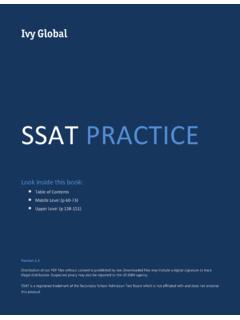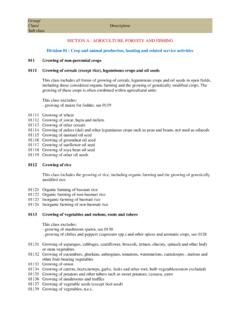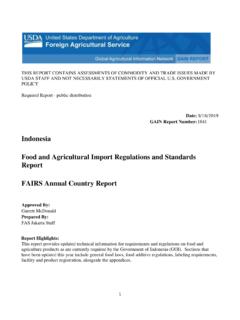Transcription of SECTION 2 40 Questions - Ivy Global
1 GO ON TO THE NEXT PAGE. Ivy Global SSAT UPPER LEVEL TEST 1 | 13 SECTION 2 40 Questions Read each passage carefully and then answer the Questions about it. For each question, decide on the basis of the passage which one of the choices best answers the question. Line 5 10 15 20 The train pulled into station at 8:05 precisely, just as the schedule demanded, and the remarkable Dr. Twill bustled off onto the platform with a crowd of other travelers. He was tired from his journey, but eager and excited to see the lights of the city again. He stretched and yawned, and decided to find a hot cup of coffee before heading out to enjoy the bright city night. His trip through the surrounding country towns had been a profitable endeavor: with a few vague explanations here, some simple demonstrations there, and a great deal of enthusiasm everywhere he went, he had been able to sell a number of his electrical cures at prices which were more than modestly profitable, and returned with a considerably lighter trunk and fatter wallet than those with which he had departed.
2 The cures were many and varied, ranging from electrical hairbrushes which promised to cure baldness and restore a youthful appearance, to electrical belts which were guaranteed to resolve indigestion, incontinence, or indeed any ailment of the gut, even to electrical shoes, the function of which was as yet unclear but undoubtedly wonderful. He had even been able to secure some rather generous investments in the development of his latest cure: a tonic of pure electrical energy, which when imbibed would most assuredly improve the whole health and well-being of the imbiber, invigorating flesh and mind from within! There remained the minor question of how he would manage to liquefy pure electricity but the buzzing of the street lights never failed to inspire, and Dr. Twill had all confidence that a solution would come soon enough. 1. It can be inferred from the passage that Dr.
3 Twill makes a living by (A) researching a great variety of diseases (B) selling devices which are supposed to cure disease (C) bottling electricity, and selling it in the country (D) inventing devices and selling the patents to rich investors (E) travelling to the city to see patients under electric lights 2. Dr. Twill seems to believe that electricity is (A) an unfortunate necessity of the modern world (B) a dangerous technology which must be carefully handled (C) a curative force of incredible potential (D) a limited but practical method for reliving certain types of pain (E) one tool among many in a doctor s arsenal against disease GO ON TO THE NEXT PAGE. Ivy Global SSAT UPPER LEVEL TEST 1 | 14 3. Based on the context of the passage, Dr. Twill was traveling in order to (A) get away from the hustle and bustle of city life (B) make a profit by selling his wares in other towns (C) find inspiration for new inventions (D) cure the ailments of people too poor to visit a doctor (E) acquire new electrical devices for the curing of disease 4.
4 According to the passage, what is the most likely reason that Dr. Twill returned from his travels with a considerably lighter trunk (lines9-10)? (A) The weather was warmer than when he left, so he needed less clothing. (B) Dr. Twill sold most of the contents of his trunk while traveling. (C) Dr. Twill had used up most of the bottled electricity in his trunk. (D) Parts of the trunk had fallen off during the trip. (E) Dr. Twill had purchased a new, lighter trunk with his profits. 5. Based on the context of the passage, imbibe (line 16) most nearly means (A) electrocute (B) invest (C) travel (D) consume (E) disease GO ON TO THE NEXT PAGE. Ivy Global SSAT UPPER LEVEL TEST 1 | 15 Line 5 10 15 20 25 The Great Library of Alexandria was a marvel of ancient Egypt. Established during the Hellenistic period, sometime between 324 and 246 BCE, the Library was reputedly an architectural wonder.
5 More importantly, the Library housed a vast collection of works from all across the ancient world and was a major center of scholarship. The Library was charged with the ambitious mission of collecting all of the world s books, and employed numerous methods to acquire new works. A well-funded acquisitions department scoured the book fairs of Rhodes and Athens, purchasing individual texts or even whole libraries. Ships that landed at the harbor of Alexandria were searched for books to add to the Library s collection. The Library also employed a number of scholars who produced original works on subjects such as astronomy, mathematics, and physics. In addition to collecting books and conducting research, the scribes and scholars of the Great Library translated texts from around the world into Greek and assembled authoritative versions from different translations. Some of the first translations of Biblical texts into Greek may have occurred at the Library in the time of Ptolemy I, although the Canonical versions would not be created for some hundreds of years more.
6 Much work was done to compile and edit authoritative versions of the Homeric myths for which the Greeks are so well known today, and these were only a few of the great works of translation and editing that took place in Alexandria in the Hellenistic period. It is ironic that the fate of the Great Library an institution dedicated to the collection and preservation of knowledge is shrouded in myth and mystery. Many sources say the Library burned down, but the date is uncertain. It may have burned down more than once, either by accident, or intentionally. Smaller sister institutions may have survived the original library, to be destroyed later. The Great Library, or some version of it, could have survived for anywhere from 300 to 1,000 years. However it ended, there can be little doubt that the scholarship of The Great Library had a great and lasting impact on history, and the works that were kept, translated, or created there have had a profound influence on our culture even to the present day.
7 6. The author s main purpose in this passage is to (A) compare and contrast different theories about the Great Library s destruction (B) describe the activities of an important historical institution (C) chronicle the role of libraries throughout history (D) discuss the literature of two ancient civilizations (E) explain the impact of the Great Library on Egypt s political history 7. It can be inferred from the passage that (A) some of the works created or edited in the Great Library survive to the present day (B) the Great Library was most likely founded by Ptolemy I (C) the Great Library was mainly funded by the sale of books (D) the scribes that lived in the Great Library were not allowed outside of Alexandria (E) most of Greece s famous myths were originally created at the Great Library GO ON TO THE NEXT PAGE. Ivy Global SSAT UPPER LEVEL TEST 1 | 16 8. According to the passage, which of the following is/are known for certain to be true?
8 I. The Great Library survived for 1,000 years. II. The Great Library was located in the city of Alexandria. III. The Great Library burned down on more than one occasion. (A) I only (B) II only (C) III only (D) I and II only (E) I, II and III 9. The author of this passage would most likely agree that (A) it was wrong for the Great Library to take books from passing ships (B) whoever destroyed the Great Library was most likely motivated by greed (C) the ultimate fate of the Great Library should always remain a mystery (D) it is very surprising that ancient people were concerned about preserving books (E) the preservation and advancement of knowledge is very important GO ON TO THE NEXT PAGE. Ivy Global SSAT UPPER LEVEL TEST 1 | 17 Line 5 10 Many of the things which we think of as vegetables are, in strict botanical terms, actually fruits. Most of us know that the tomato, for example, is technically a fruit and when we commit the grave error of referring to a tomato as a vegetable , there s often some wise soul nearby who is willing to correct us.
9 But did you know that the pumpkin is also a botanical fruit? The same goes for cucumbers, squash, and even corn because, in botanical terms, a fruit is any edible part of a plant derived from its ovary. An admirably clear definition, as one might well expect from the scientific community! And yet, that hasn t done much to change which foods we the public think of as fruits, and which ones as vegetables. To complicate matters further, a body no less august than the Supreme Court itself once had to rule on whether tomatoes counted as vegetables, and they bucked the scientific definition as well. According to the Supreme Court, a vegetable is any part of a plant which is generally served with the main part of the meal, whereas a fruit is a plant which would generally be eaten with or as a desert although as far as I know, they took no position on appetizers. 10. The author s primary topic in this passage is (A) the scientific definitions of fruits and vegetables (B) the Supreme Court s decision that the tomato is a vegetable (C) the biological structure of tomatoes, cucumbers, pumpkins, and squash (D) the conflicts over botanical classifications within the scientific community (E) the controversy over popular conceptions of fruits and vegetables 11.
10 Based on the passage, the author would most likely agree with which of the following statements? (A) The goals of scientists are at odds with the public s health. (B) It doesn t matter what you call them, as long as you eat plenty of healthy plants. (C) Scientists often create definitions that are not useful to the general public. (D) The Supreme Court lacks the authority to define botanical terms. (E) Tomatoes are best served as an appetizer. GO ON TO THE NEXT PAGE. Ivy Global SSAT UPPER LEVEL TEST 1 | 18 12. As it is used in line 9, the word august most likely means (A) respected and important (B) botanical (C) the month which follows July (D) light-humored and funny (E) very angry 13. When the author says that it is a grave error to call a tomato a vegetable (line 3), his tone could best be described as (A) sympathetic (B) aloof (C) emphatic (D) sarcastic (E) wrathful GO ON TO THE NEXT PAGE.

















